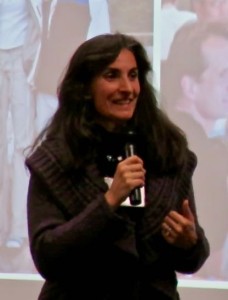 At the 2016 ESTIA conference, Still Water co-director and New Media professor Joline Blais used her keynote address to acknowledge a number of the most important practitioners who have contributed to her creative projects over the past decade.
At the 2016 ESTIA conference, Still Water co-director and New Media professor Joline Blais used her keynote address to acknowledge a number of the most important practitioners who have contributed to her creative projects over the past decade.
From permaculture design teams to intermedia performances to transition-town meetings, Blais recounted what she has learned from her collaborators in Native and artistic communities of the Northeast.
LongGreenhouse, for example, was a living-learning center on the edge of the UMaine campus in Orono dedicated to exploring connections among indigenous culture, digital culture, and permaculture. Its intergenerational and intercultural workshops would not have been possible without the mentorship of Mi’kmaq elder Miigima’an and enthusiasm of teacher Debby Bell-Smith, whose home school students joined in workshops and conversations with university undergraduate and grad students.
Blais’ keynote also conveyed lessons drawn directly from the natural world, acquired by the practice of careful listening that is crucial to permaculture. Cultivating a lively attention to the plants in our environment, she argued, offers insights into the web of connections that sustain local and global ecosystems.
Held at UMaine’s Hutchinson Center, the 2016 ESTIA conference also featured celebrated Nipmuck floutist Hawk Henries, herbalist Deb Soule, and New York Open Center cofounder Ralph White.
Blais will be teaching a permaculture and creativity course in the University of Maine’s graduate Intermedia program in the fall of 2017. For more information, contact her at jblais [AT] maine [DOT] edu.
